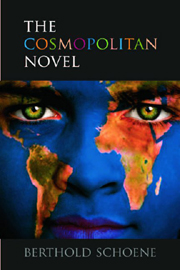3 - The World Begins Its Turn with You, or How David Mitchell's Novels Think
from II - TOUR DU MONDE
Published online by Cambridge University Press: 12 September 2012
Summary
A curious blend of Julian Barnes's The History of the World in 10½ Chapters (1989) and Kazuo Ishiguro's Anglo-Japanese novels, with some of the time-travelling elements of Virginia Woolf's Orlando (1928) mixed in, David Mitchell's Ghostwritten (1999) and Cloud Atlas (2004) pioneer a new cosmopolitan modus operandi for twenty- first-century British fiction. Mitchell's narratives do not so much break with the tradition of the English novel as subtly deconstruct, untie and defamiliarise it. They comprise acutely fragmented, yet at the same time smoothly cohesive compositions strategically broken up into small-récit mosaics of divergent perspectives that together span and unify the globe. Both novels explore new past-present-future continua without lapsing into mere fanciful historiographical futurism. This is the case even though both novels contain allusions to Aldous Huxley's and George Orwell's famous dystopian classics. In Ghostwritten various characters find themselves labelled within a strict socio-economic hierarchy of alphas and gammas (as in His Serendipity's and Dwight Silverwind's ominous New Age ideologies), while Orwell's nightmarish picture of the future as ‘a boot stamping on a human face, forever’ recurs across both novels (as, for instance, in the ‘Holy Mountain’ section of Ghostwritten or ‘An Orison of Sonmi-451’ in Cloud Atlas).
Mitchell's writing charts human existence both transterritorially and as always determined by locally specific conditions. His work lends a unique voice to the Nancean notion of community as constant inoperative reconfiguration; it also illustrates perfectly Nancy's understanding of history, according to which ‘historical change cannot be achieved in terms of a dialectical or teleological process, but rather in terms of a constant birth or becoming of singular-plural sense’ (James 2006: 199).
- Type
- Chapter
- Information
- The Cosmopolitan Novel , pp. 97 - 124Publisher: Edinburgh University PressPrint publication year: 2009



